Comparative Analysis: Rules vs. Principles Accounting Approaches
VerifiedAdded on 2022/10/16
|8
|1315
|17
Report
AI Summary
This report provides a comprehensive analysis of the rules-based and principles-based approaches to accounting, focusing on their advantages and disadvantages. The report examines how these approaches impact the preparation of annual reports, particularly within the frameworks of GAAP and IFRS. It discusses the limitations of each approach, such as the lack of specific guidelines in the principles-based method and the potential for manipulation in the rules-based method. The report also highlights the strengths of each approach, including the flexibility of the principles-based method and the structured standards of the rules-based method. Furthermore, the analysis explores which approach is more appropriate for presenting accurate financial positions, concluding that the principles-based approach is often preferred for its transparency and reduced potential for manipulation. The report concludes with references to relevant literature supporting the analysis.
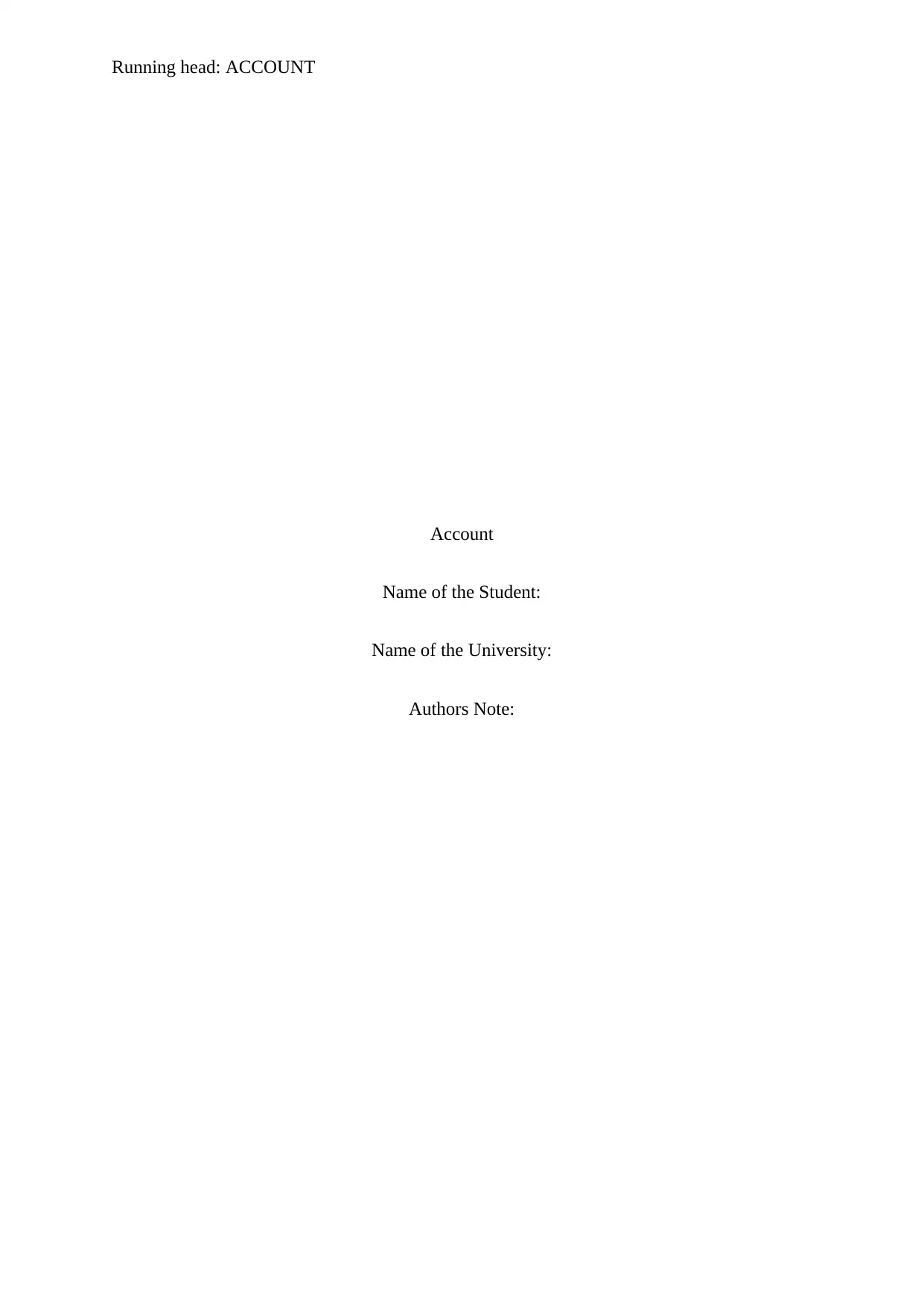
Running head: ACCOUNT
Account
Name of the Student:
Name of the University:
Authors Note:
Account
Name of the Student:
Name of the University:
Authors Note:
Paraphrase This Document
Need a fresh take? Get an instant paraphrase of this document with our AI Paraphraser
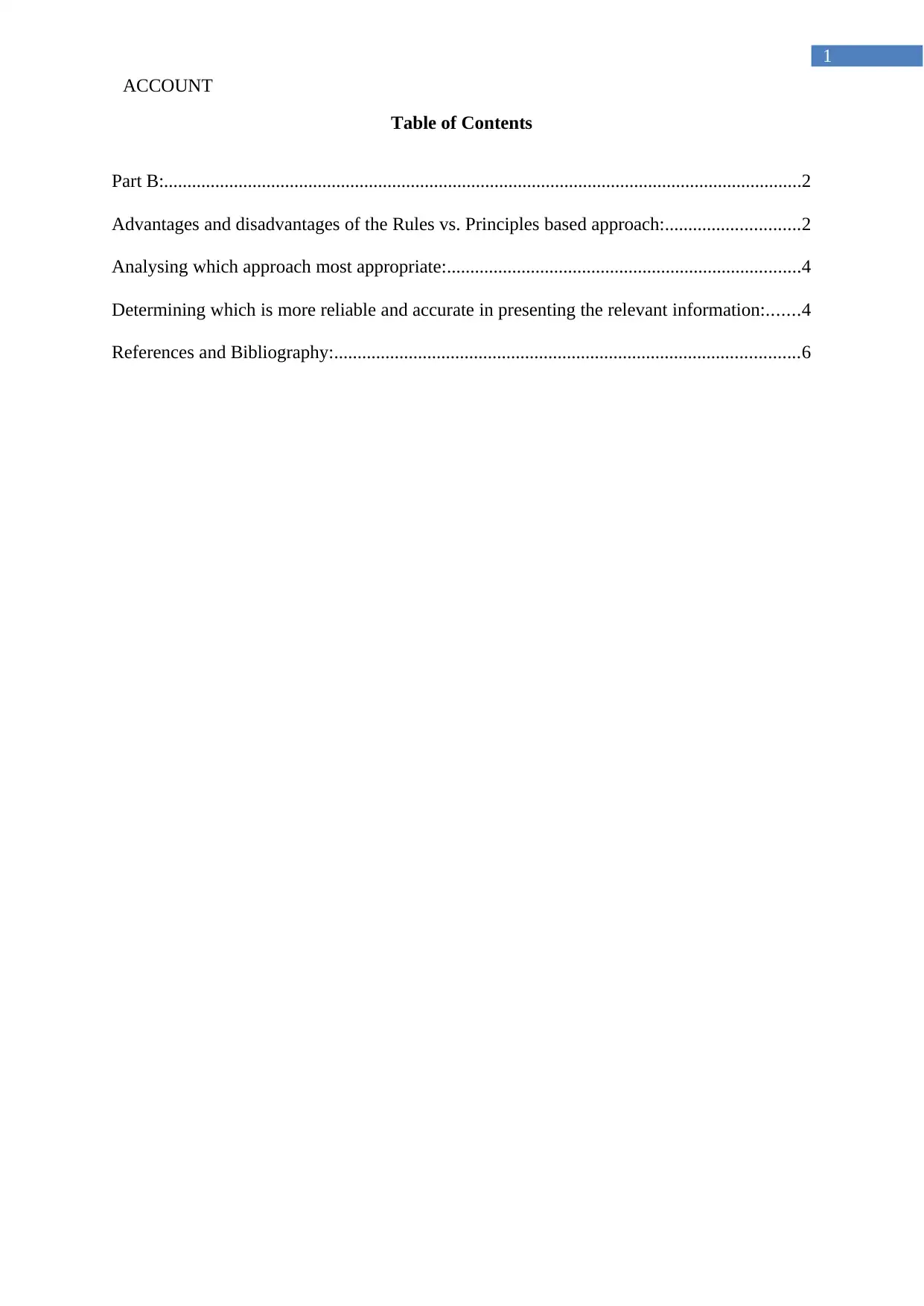
ACCOUNT
1
Table of Contents
Part B:.........................................................................................................................................2
Advantages and disadvantages of the Rules vs. Principles based approach:.............................2
Analysing which approach most appropriate:............................................................................4
Determining which is more reliable and accurate in presenting the relevant information:.......4
References and Bibliography:....................................................................................................6
1
Table of Contents
Part B:.........................................................................................................................................2
Advantages and disadvantages of the Rules vs. Principles based approach:.............................2
Analysing which approach most appropriate:............................................................................4
Determining which is more reliable and accurate in presenting the relevant information:.......4
References and Bibliography:....................................................................................................6
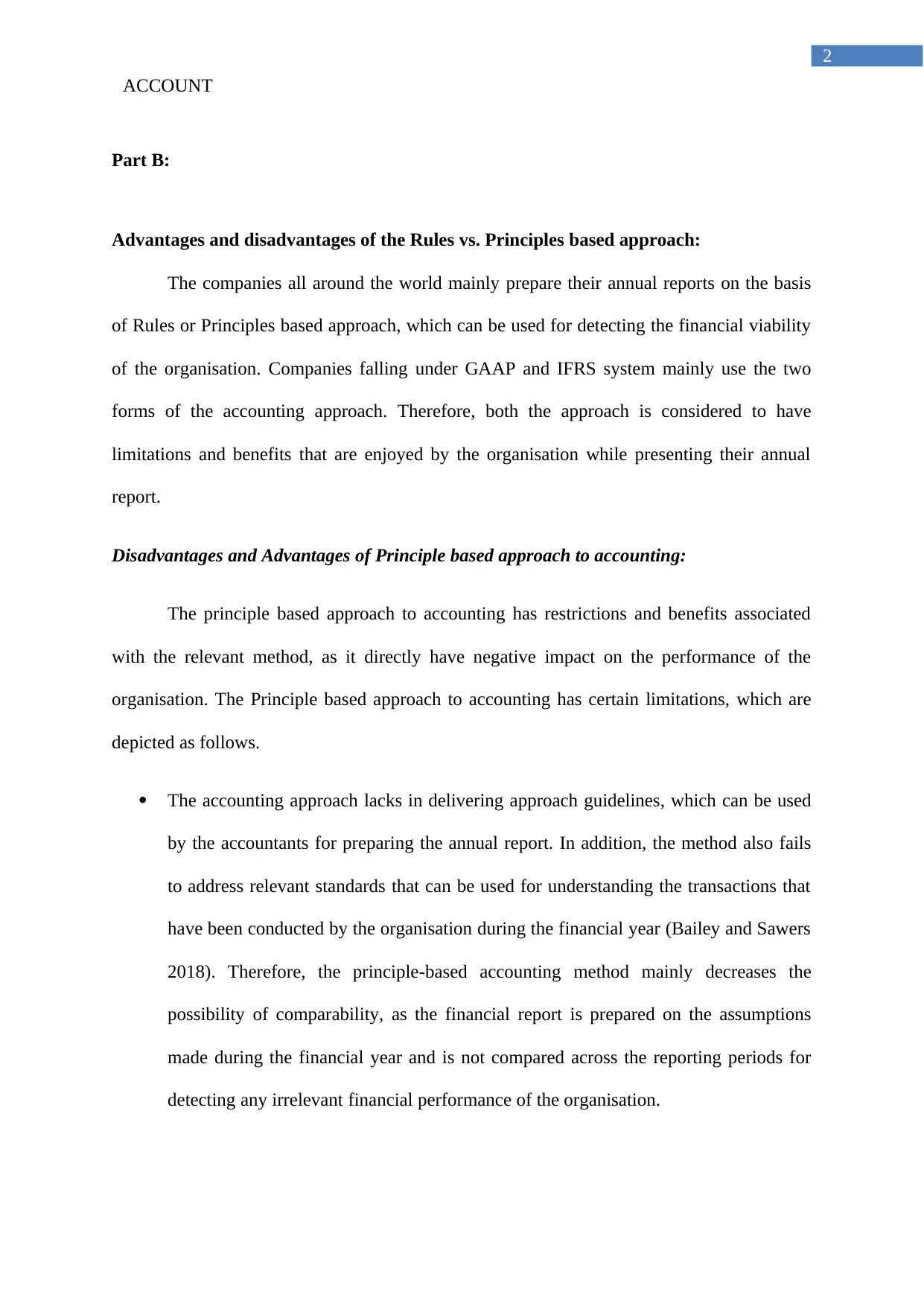
ACCOUNT
2
Part B:
Advantages and disadvantages of the Rules vs. Principles based approach:
The companies all around the world mainly prepare their annual reports on the basis
of Rules or Principles based approach, which can be used for detecting the financial viability
of the organisation. Companies falling under GAAP and IFRS system mainly use the two
forms of the accounting approach. Therefore, both the approach is considered to have
limitations and benefits that are enjoyed by the organisation while presenting their annual
report.
Disadvantages and Advantages of Principle based approach to accounting:
The principle based approach to accounting has restrictions and benefits associated
with the relevant method, as it directly have negative impact on the performance of the
organisation. The Principle based approach to accounting has certain limitations, which are
depicted as follows.
The accounting approach lacks in delivering approach guidelines, which can be used
by the accountants for preparing the annual report. In addition, the method also fails
to address relevant standards that can be used for understanding the transactions that
have been conducted by the organisation during the financial year (Bailey and Sawers
2018). Therefore, the principle-based accounting method mainly decreases the
possibility of comparability, as the financial report is prepared on the assumptions
made during the financial year and is not compared across the reporting periods for
detecting any irrelevant financial performance of the organisation.
2
Part B:
Advantages and disadvantages of the Rules vs. Principles based approach:
The companies all around the world mainly prepare their annual reports on the basis
of Rules or Principles based approach, which can be used for detecting the financial viability
of the organisation. Companies falling under GAAP and IFRS system mainly use the two
forms of the accounting approach. Therefore, both the approach is considered to have
limitations and benefits that are enjoyed by the organisation while presenting their annual
report.
Disadvantages and Advantages of Principle based approach to accounting:
The principle based approach to accounting has restrictions and benefits associated
with the relevant method, as it directly have negative impact on the performance of the
organisation. The Principle based approach to accounting has certain limitations, which are
depicted as follows.
The accounting approach lacks in delivering approach guidelines, which can be used
by the accountants for preparing the annual report. In addition, the method also fails
to address relevant standards that can be used for understanding the transactions that
have been conducted by the organisation during the financial year (Bailey and Sawers
2018). Therefore, the principle-based accounting method mainly decreases the
possibility of comparability, as the financial report is prepared on the assumptions
made during the financial year and is not compared across the reporting periods for
detecting any irrelevant financial performance of the organisation.
⊘ This is a preview!⊘
Do you want full access?
Subscribe today to unlock all pages.

Trusted by 1+ million students worldwide
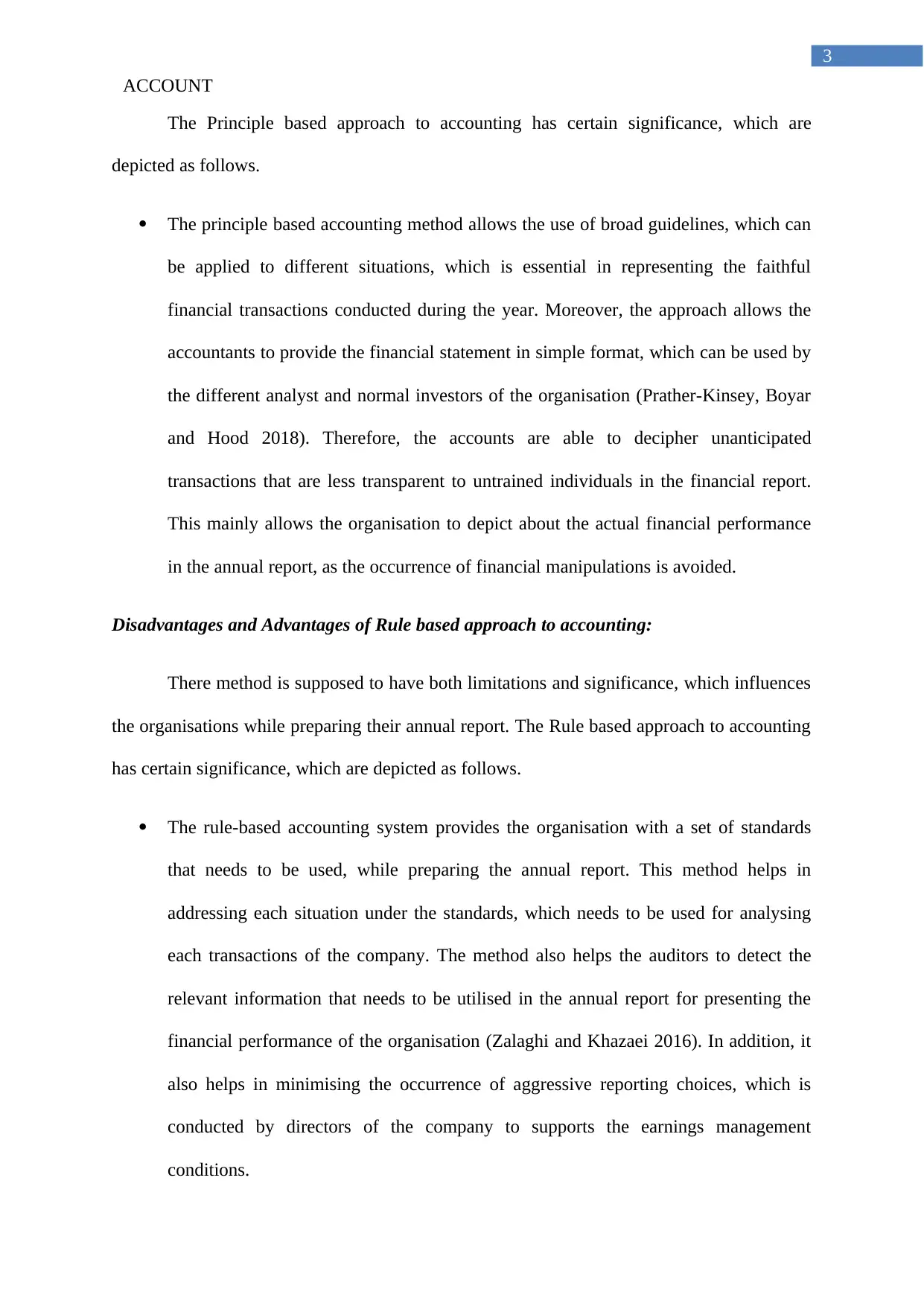
ACCOUNT
3
The Principle based approach to accounting has certain significance, which are
depicted as follows.
The principle based accounting method allows the use of broad guidelines, which can
be applied to different situations, which is essential in representing the faithful
financial transactions conducted during the year. Moreover, the approach allows the
accountants to provide the financial statement in simple format, which can be used by
the different analyst and normal investors of the organisation (Prather-Kinsey, Boyar
and Hood 2018). Therefore, the accounts are able to decipher unanticipated
transactions that are less transparent to untrained individuals in the financial report.
This mainly allows the organisation to depict about the actual financial performance
in the annual report, as the occurrence of financial manipulations is avoided.
Disadvantages and Advantages of Rule based approach to accounting:
There method is supposed to have both limitations and significance, which influences
the organisations while preparing their annual report. The Rule based approach to accounting
has certain significance, which are depicted as follows.
The rule-based accounting system provides the organisation with a set of standards
that needs to be used, while preparing the annual report. This method helps in
addressing each situation under the standards, which needs to be used for analysing
each transactions of the company. The method also helps the auditors to detect the
relevant information that needs to be utilised in the annual report for presenting the
financial performance of the organisation (Zalaghi and Khazaei 2016). In addition, it
also helps in minimising the occurrence of aggressive reporting choices, which is
conducted by directors of the company to supports the earnings management
conditions.
3
The Principle based approach to accounting has certain significance, which are
depicted as follows.
The principle based accounting method allows the use of broad guidelines, which can
be applied to different situations, which is essential in representing the faithful
financial transactions conducted during the year. Moreover, the approach allows the
accountants to provide the financial statement in simple format, which can be used by
the different analyst and normal investors of the organisation (Prather-Kinsey, Boyar
and Hood 2018). Therefore, the accounts are able to decipher unanticipated
transactions that are less transparent to untrained individuals in the financial report.
This mainly allows the organisation to depict about the actual financial performance
in the annual report, as the occurrence of financial manipulations is avoided.
Disadvantages and Advantages of Rule based approach to accounting:
There method is supposed to have both limitations and significance, which influences
the organisations while preparing their annual report. The Rule based approach to accounting
has certain significance, which are depicted as follows.
The rule-based accounting system provides the organisation with a set of standards
that needs to be used, while preparing the annual report. This method helps in
addressing each situation under the standards, which needs to be used for analysing
each transactions of the company. The method also helps the auditors to detect the
relevant information that needs to be utilised in the annual report for presenting the
financial performance of the organisation (Zalaghi and Khazaei 2016). In addition, it
also helps in minimising the occurrence of aggressive reporting choices, which is
conducted by directors of the company to supports the earnings management
conditions.
Paraphrase This Document
Need a fresh take? Get an instant paraphrase of this document with our AI Paraphraser
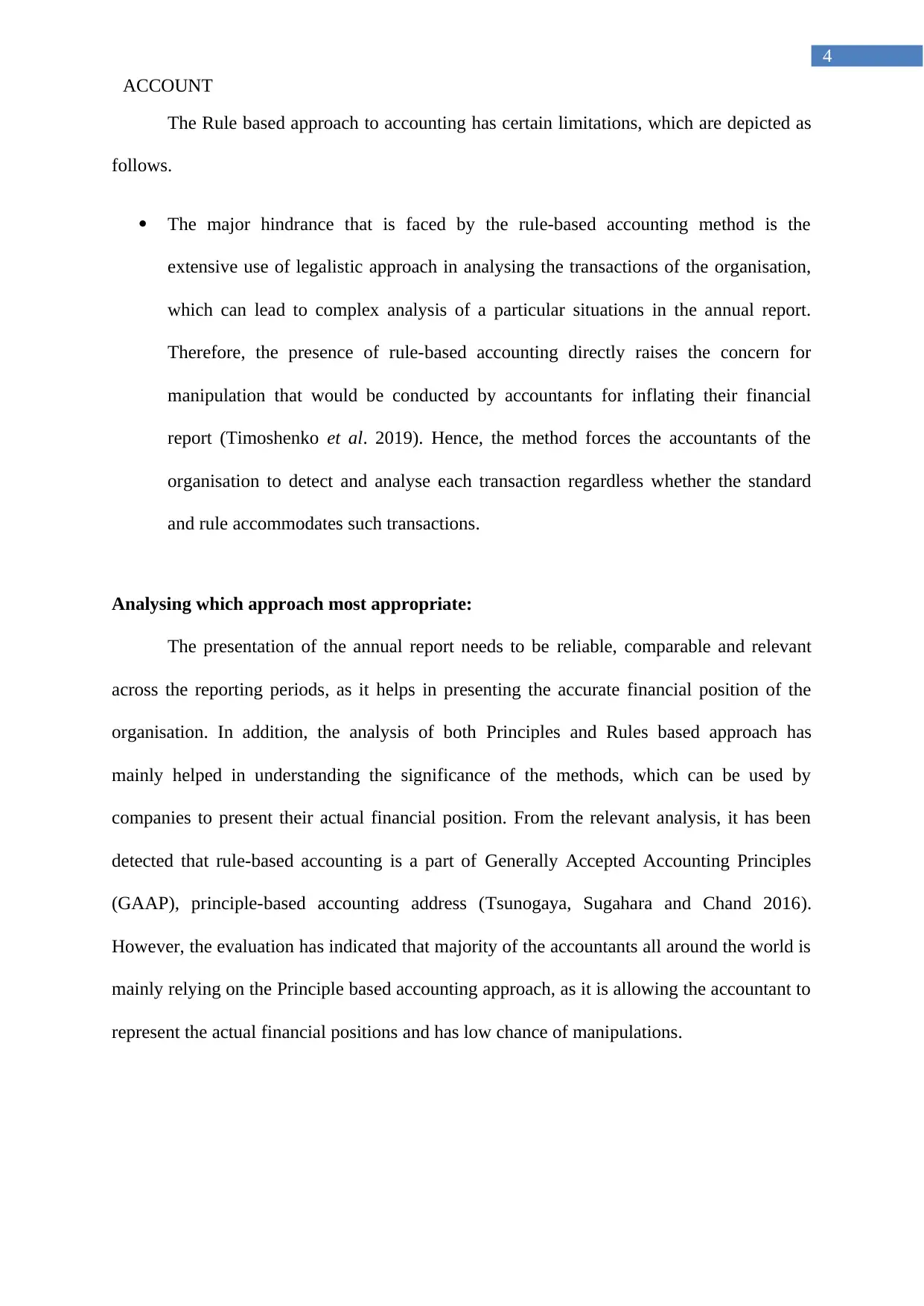
ACCOUNT
4
The Rule based approach to accounting has certain limitations, which are depicted as
follows.
The major hindrance that is faced by the rule-based accounting method is the
extensive use of legalistic approach in analysing the transactions of the organisation,
which can lead to complex analysis of a particular situations in the annual report.
Therefore, the presence of rule-based accounting directly raises the concern for
manipulation that would be conducted by accountants for inflating their financial
report (Timoshenko et al. 2019). Hence, the method forces the accountants of the
organisation to detect and analyse each transaction regardless whether the standard
and rule accommodates such transactions.
Analysing which approach most appropriate:
The presentation of the annual report needs to be reliable, comparable and relevant
across the reporting periods, as it helps in presenting the accurate financial position of the
organisation. In addition, the analysis of both Principles and Rules based approach has
mainly helped in understanding the significance of the methods, which can be used by
companies to present their actual financial position. From the relevant analysis, it has been
detected that rule-based accounting is a part of Generally Accepted Accounting Principles
(GAAP), principle-based accounting address (Tsunogaya, Sugahara and Chand 2016).
However, the evaluation has indicated that majority of the accountants all around the world is
mainly relying on the Principle based accounting approach, as it is allowing the accountant to
represent the actual financial positions and has low chance of manipulations.
4
The Rule based approach to accounting has certain limitations, which are depicted as
follows.
The major hindrance that is faced by the rule-based accounting method is the
extensive use of legalistic approach in analysing the transactions of the organisation,
which can lead to complex analysis of a particular situations in the annual report.
Therefore, the presence of rule-based accounting directly raises the concern for
manipulation that would be conducted by accountants for inflating their financial
report (Timoshenko et al. 2019). Hence, the method forces the accountants of the
organisation to detect and analyse each transaction regardless whether the standard
and rule accommodates such transactions.
Analysing which approach most appropriate:
The presentation of the annual report needs to be reliable, comparable and relevant
across the reporting periods, as it helps in presenting the accurate financial position of the
organisation. In addition, the analysis of both Principles and Rules based approach has
mainly helped in understanding the significance of the methods, which can be used by
companies to present their actual financial position. From the relevant analysis, it has been
detected that rule-based accounting is a part of Generally Accepted Accounting Principles
(GAAP), principle-based accounting address (Tsunogaya, Sugahara and Chand 2016).
However, the evaluation has indicated that majority of the accountants all around the world is
mainly relying on the Principle based accounting approach, as it is allowing the accountant to
represent the actual financial positions and has low chance of manipulations.
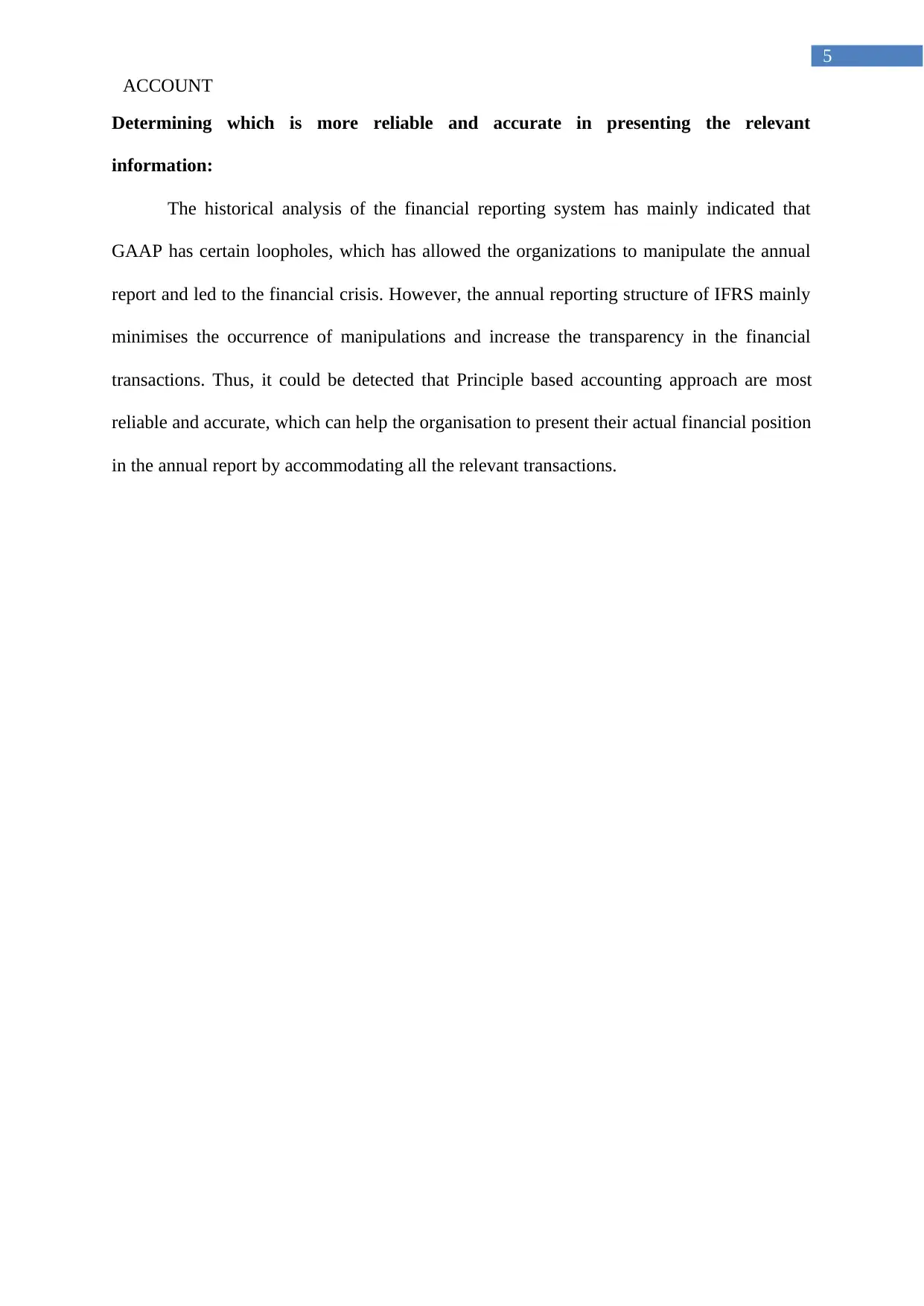
ACCOUNT
5
Determining which is more reliable and accurate in presenting the relevant
information:
The historical analysis of the financial reporting system has mainly indicated that
GAAP has certain loopholes, which has allowed the organizations to manipulate the annual
report and led to the financial crisis. However, the annual reporting structure of IFRS mainly
minimises the occurrence of manipulations and increase the transparency in the financial
transactions. Thus, it could be detected that Principle based accounting approach are most
reliable and accurate, which can help the organisation to present their actual financial position
in the annual report by accommodating all the relevant transactions.
5
Determining which is more reliable and accurate in presenting the relevant
information:
The historical analysis of the financial reporting system has mainly indicated that
GAAP has certain loopholes, which has allowed the organizations to manipulate the annual
report and led to the financial crisis. However, the annual reporting structure of IFRS mainly
minimises the occurrence of manipulations and increase the transparency in the financial
transactions. Thus, it could be detected that Principle based accounting approach are most
reliable and accurate, which can help the organisation to present their actual financial position
in the annual report by accommodating all the relevant transactions.
⊘ This is a preview!⊘
Do you want full access?
Subscribe today to unlock all pages.

Trusted by 1+ million students worldwide
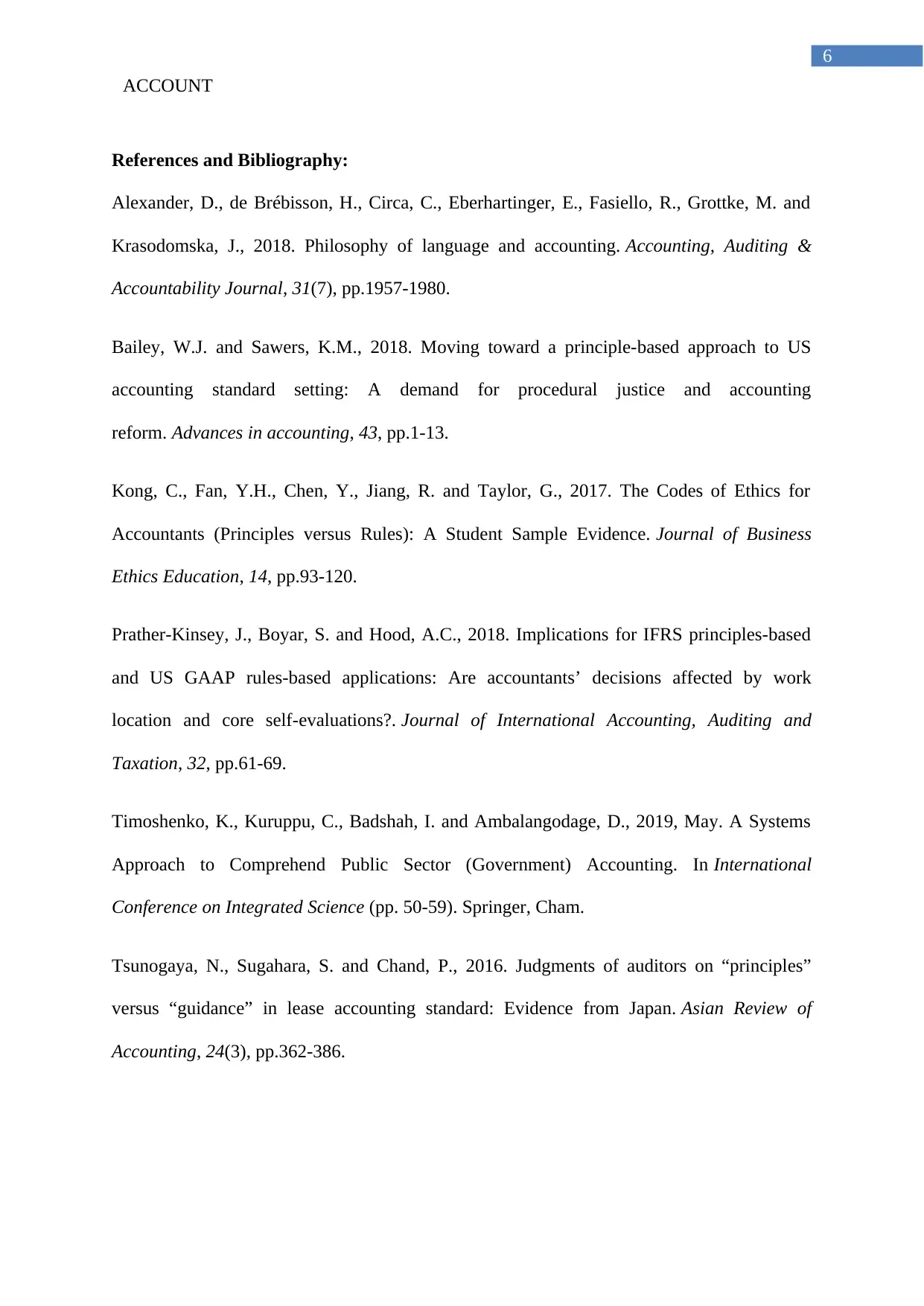
ACCOUNT
6
References and Bibliography:
Alexander, D., de Brébisson, H., Circa, C., Eberhartinger, E., Fasiello, R., Grottke, M. and
Krasodomska, J., 2018. Philosophy of language and accounting. Accounting, Auditing &
Accountability Journal, 31(7), pp.1957-1980.
Bailey, W.J. and Sawers, K.M., 2018. Moving toward a principle-based approach to US
accounting standard setting: A demand for procedural justice and accounting
reform. Advances in accounting, 43, pp.1-13.
Kong, C., Fan, Y.H., Chen, Y., Jiang, R. and Taylor, G., 2017. The Codes of Ethics for
Accountants (Principles versus Rules): A Student Sample Evidence. Journal of Business
Ethics Education, 14, pp.93-120.
Prather-Kinsey, J., Boyar, S. and Hood, A.C., 2018. Implications for IFRS principles-based
and US GAAP rules-based applications: Are accountants’ decisions affected by work
location and core self-evaluations?. Journal of International Accounting, Auditing and
Taxation, 32, pp.61-69.
Timoshenko, K., Kuruppu, C., Badshah, I. and Ambalangodage, D., 2019, May. A Systems
Approach to Comprehend Public Sector (Government) Accounting. In International
Conference on Integrated Science (pp. 50-59). Springer, Cham.
Tsunogaya, N., Sugahara, S. and Chand, P., 2016. Judgments of auditors on “principles”
versus “guidance” in lease accounting standard: Evidence from Japan. Asian Review of
Accounting, 24(3), pp.362-386.
6
References and Bibliography:
Alexander, D., de Brébisson, H., Circa, C., Eberhartinger, E., Fasiello, R., Grottke, M. and
Krasodomska, J., 2018. Philosophy of language and accounting. Accounting, Auditing &
Accountability Journal, 31(7), pp.1957-1980.
Bailey, W.J. and Sawers, K.M., 2018. Moving toward a principle-based approach to US
accounting standard setting: A demand for procedural justice and accounting
reform. Advances in accounting, 43, pp.1-13.
Kong, C., Fan, Y.H., Chen, Y., Jiang, R. and Taylor, G., 2017. The Codes of Ethics for
Accountants (Principles versus Rules): A Student Sample Evidence. Journal of Business
Ethics Education, 14, pp.93-120.
Prather-Kinsey, J., Boyar, S. and Hood, A.C., 2018. Implications for IFRS principles-based
and US GAAP rules-based applications: Are accountants’ decisions affected by work
location and core self-evaluations?. Journal of International Accounting, Auditing and
Taxation, 32, pp.61-69.
Timoshenko, K., Kuruppu, C., Badshah, I. and Ambalangodage, D., 2019, May. A Systems
Approach to Comprehend Public Sector (Government) Accounting. In International
Conference on Integrated Science (pp. 50-59). Springer, Cham.
Tsunogaya, N., Sugahara, S. and Chand, P., 2016. Judgments of auditors on “principles”
versus “guidance” in lease accounting standard: Evidence from Japan. Asian Review of
Accounting, 24(3), pp.362-386.
Paraphrase This Document
Need a fresh take? Get an instant paraphrase of this document with our AI Paraphraser
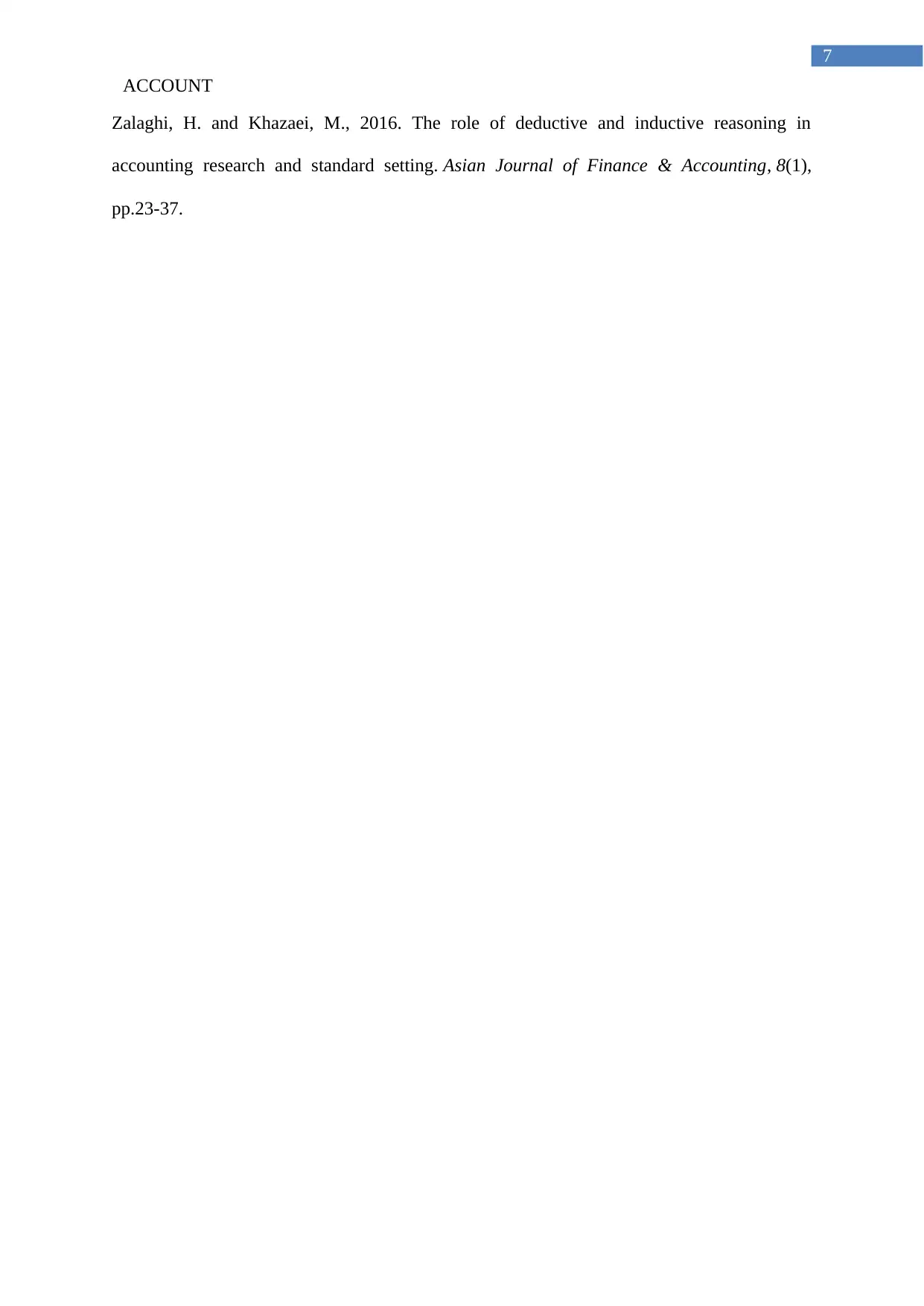
ACCOUNT
7
Zalaghi, H. and Khazaei, M., 2016. The role of deductive and inductive reasoning in
accounting research and standard setting. Asian Journal of Finance & Accounting, 8(1),
pp.23-37.
7
Zalaghi, H. and Khazaei, M., 2016. The role of deductive and inductive reasoning in
accounting research and standard setting. Asian Journal of Finance & Accounting, 8(1),
pp.23-37.
1 out of 8
Related Documents
Your All-in-One AI-Powered Toolkit for Academic Success.
+13062052269
info@desklib.com
Available 24*7 on WhatsApp / Email
![[object Object]](/_next/static/media/star-bottom.7253800d.svg)
Unlock your academic potential
Copyright © 2020–2026 A2Z Services. All Rights Reserved. Developed and managed by ZUCOL.





